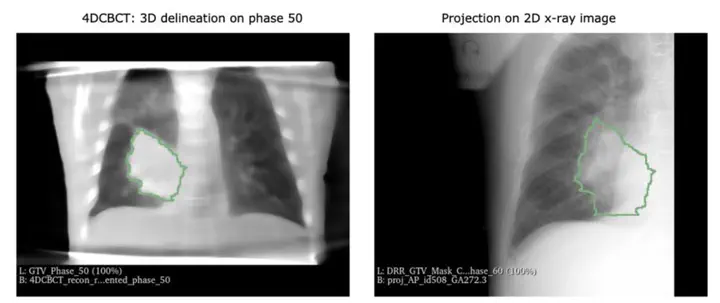DFG AIM-CBCT-ART
 Lung tumor tracking on 4DCBCT and on x-ray projections.
Lung tumor tracking on 4DCBCT and on x-ray projections.
Adaptive radiotherapy (ART) enables highly conformal tumor irradiation with optimal sparing of healthy tissue by adapting the applied radiation dose to the current patient anatomy on a daily basis. However, in addition to adaptation due to inter-fractional anatomical changes, intra-fractional motion, in particular due to respiration, must be addressed. In modern cone-beam computed tomography (CBCT)-guided radiotherapy, this is achieved through gated irradiation: the beam is only applied when the tumor is in a predetermined position. However, the tumor position itself is currently only derived from external surrogates, whose correlation with the actual internal tumor movement is often questionable. Our project aims to significantly improve the accuracy of markerless tumor tracking by using CBCT projections acquired during irradiation to directly track internal tumor motion using artificial intelligence (AI). Based on a large external database (LIDC), we will first train the required AI baseline model (BM, Retina Unet). The aim is to detect the tumor directly with millimeter precision and fully automatically for all CBCT projection angles (360°). In a second step, patient-specific (PS) models are created by fine-tuning the BM based on an LMU-internal database of lung cancer patients. For this purpose, the CT data already available prior to treatment, including expert contours of the tumor, are used as input to tailor the BMs to the individual patients. To ensure robustness to domain shifts between digitally reconstructed radiographs and real x-ray projections, we will consider optional PS training on a first CBCT scan. The accuracy of the PS models is evaluated in a clinically realistic manner using existing CBCT projection data including ground truth tumor contours. After the models have been established using internal data, we will also transfer them to external data from the University Hospital of Cologne, where a conceptually different type of CBCT scanner is operated. This should ensure that as many institutes, and therefore patients, as possible will benefit from the planned developments. In our project, we also address the critical issue of imaging dose by demonstrating that existing AI-based super-resolution algorithms allow tumor tracking with only a fraction of the dose without sacrificing accuracy. Finally, a detailed experimental validation of the developed models with dedicated lung phantoms is planned at the LMU Klinikum Munich and the MAASTRO Clinic in Maastricht (same CBCT scanner type as at the University Hospital Cologne). In the long term, the developed AI models can be straightforwardly integrated into today’s clinical workflows and improve the accuracy of tracking moving tumors and thus their treatment.
